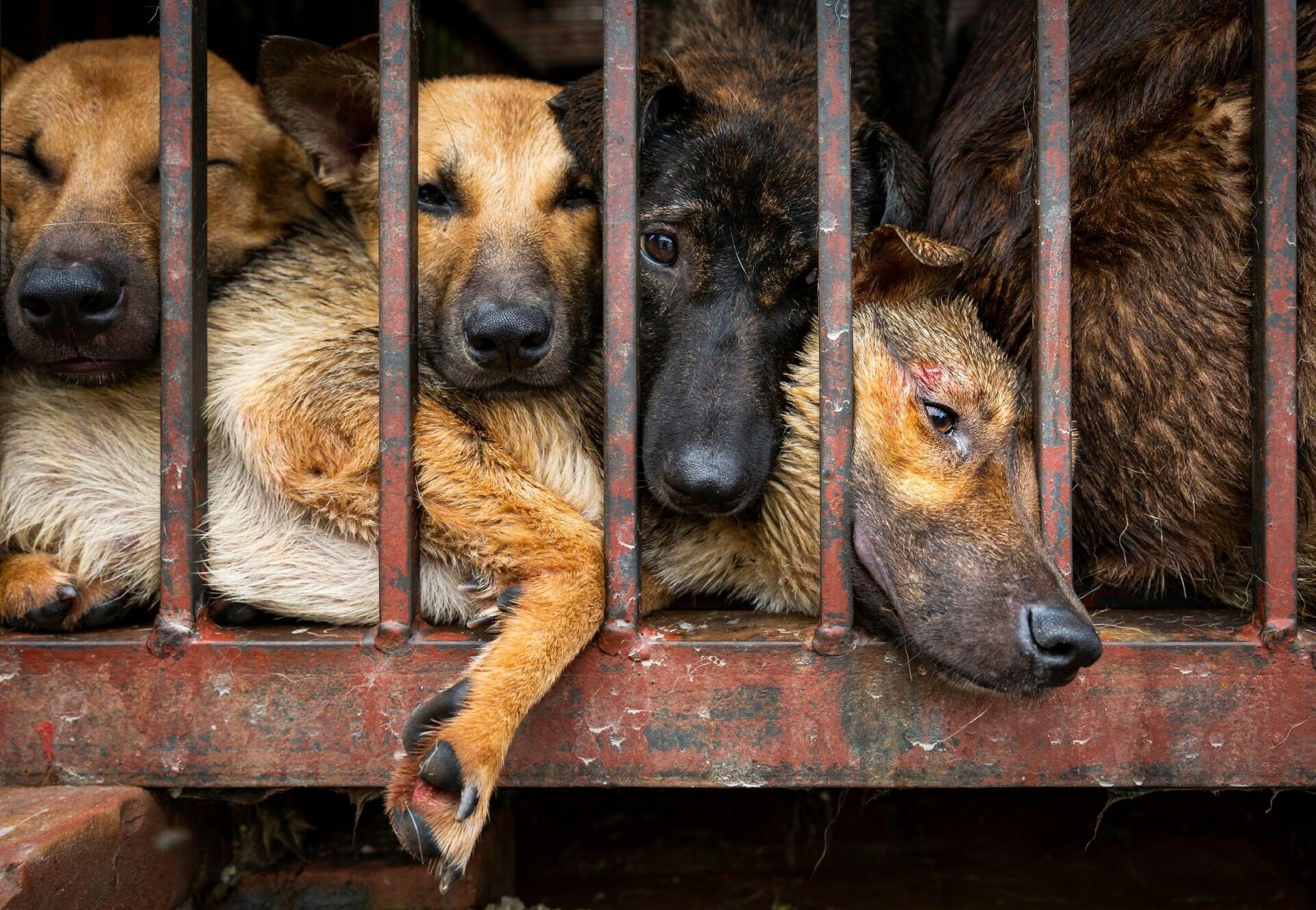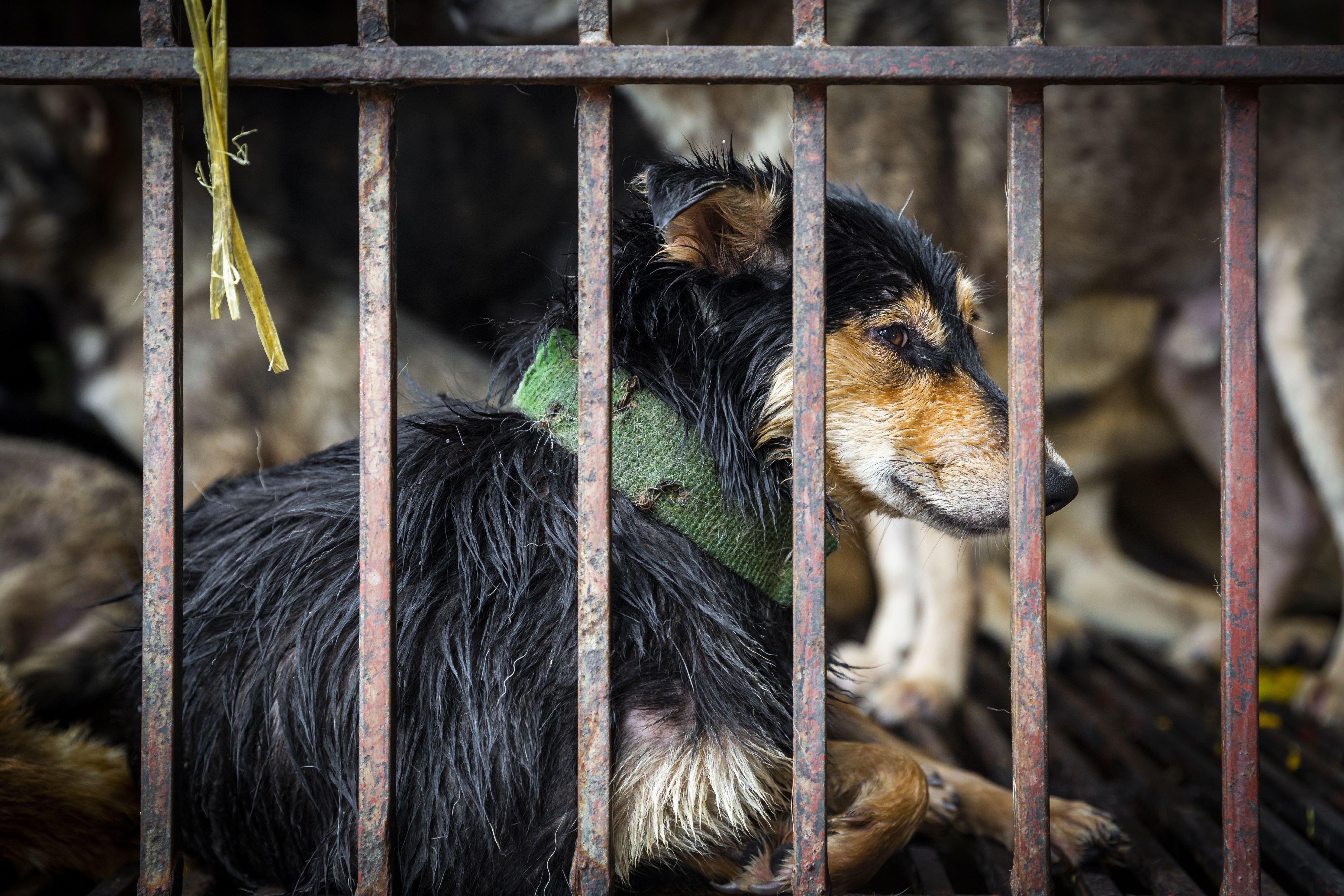
Central Java’s Karanganyar Regency announces action plan to end the dog meat trade after campaigners expose brutal trade in dogs for human consumption
Shocking Dog Meat Free Indonesia exposé leads to launch of Karanganyar action plan to eliminate brutal dog meat trade
Indonesia’s Regency of Karanganyar in Java has pledged an action plan to end its brutal dog meat trade, following a shocking investigation by campaign coalition Dog Meat Free Indonesia. The action plan includes closing all 21 stalls selling dog meat in the regency and the creation of alternative livelihoods for those people currently reliant on the trade. The local government plans to host a meeting with the traders and vendors to announce the ban and to discuss alternative livelihood opportunities, a first of its kind in Java.
The Dog Meat-Free Indonesia (DMFI) coalition’s investigations showed dogs being beaten and strung upside down to bleed out whilst still conscious, and in full view of other terrified dogs bound and caged who await their turn.
The horrific footage prompted renewed calls for urgent action by campaigners, national and international celebrity ambassadors and concerned citizens from throughout Indonesia and around the world. The action being taken in Karanganyar will save almost 2,000 dogs each month from slaughter, and campaigners are optimistic that this will mark the start of a nationwide movement to tackle this illegal and dangerous trade.
When announcing the development of an action plan Regent of Karanganyar Regency Drs. Juliyatmono denounced the trade, warning of the grave risks to public health it poses.

Whilst dog meat is consumed by some for its perceived health properties, the reality is that the dog meat trade poses a significant and very real threat to public health, with rabies transmission being of particularly grave concern. Research shows that the highest prevalence of rabies occurs in provinces and regencies with the highest dog meat consumption, bringing devastating consequences for human health, animal welfare and the local economy.
As an ever-growing number of countries and territories in the region and around the world take action to tackle the illegal dog and cat meat trades, global public and political communities are becoming increasingly intolerant to the trades. With the recent Indonesian presidential elections having taken place on April 17, campaigners hope that now is the time for the government to prioritise this issue on grounds of public health and safety as well as animal welfare, and fulfill its pledge to take action to tackle the trade.
Member of the Dog Meat Free Indonesia coalition, FOUR PAWS, which has an office in Sydney, has been active across Southeast Asia in its efforts to protect dogs and cats from suffering and cruelty, providing vital desexing and vaccinations programs for thousands of animals to date, in conjunction with raising much needed local awareness of the brutal cat and dog meat trades.
This announced action plan follows a 2018 statement from government officials that they would support a ban.
Dog Meat-Free Indonesia (DMFI) is a coalition of national and international animal protection organisations comprising Change For Animals Foundation, FOUR PAWS, Humane Society International, Animal Friends Jogja and Jakarta Animal Aid Network which documents the brutality of the trades and campaigns for a ban on grounds of animal cruelty and risks to public health.
Dog theft for the meat trade is a serious problem in Indonesia. DMFI has interviewed many residents who have described their terrifying ordeal with armed traders stealing their pets at night. Despite the obvious law-breaking, thefts are rarely taken seriously by law enforcement, so the thieves go unpunished.
Globally, opposition to the dog and cat meat trades is increasing, with an ever-growing number of countries and territories in the region (Taiwan, Hong Kong, the Philippines and Thailand) and internationally (the United States) banning the trade in and slaughter, sale, consumption of dogs.
FOUR PAWS press contact
Follow us on social media
Stay up to date on this topic and on all FOUR PAWS activities on our social media channels:
About FOUR PAWS
FOUR PAWS is the global animal welfare organisation for animals under direct human influence, which reveals suffering, rescues animals in need and protects them.
Founded in 1988 in Vienna by Heli Dungler and friends, the organisation advocates for a world where humans treat animals with respect, empathy and understanding. The sustainable campaigns and projects of FOUR PAWS focus on companion animals including stray dogs and cats, animals in fashion, farm animals, and wild animals – such as bears, big cats, and orangutans – kept in inappropriate conditions as well as in disaster and conflict zones.
With offices in Australia, Austria, Belgium, Bulgaria, France, Germany, Kosovo, the Netherlands, Switzerland, South Africa, Thailand, Ukraine, the UK, the USA, and Vietnam as well as sanctuaries for rescued animals in eleven countries, FOUR PAWS provides rapid help and long-term solutions. www.four-paws.org.au

